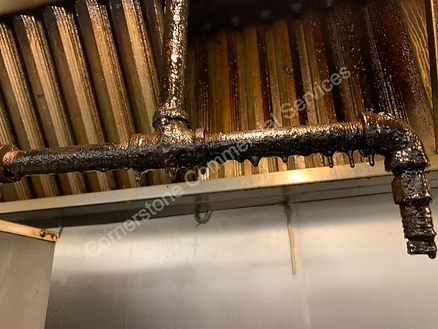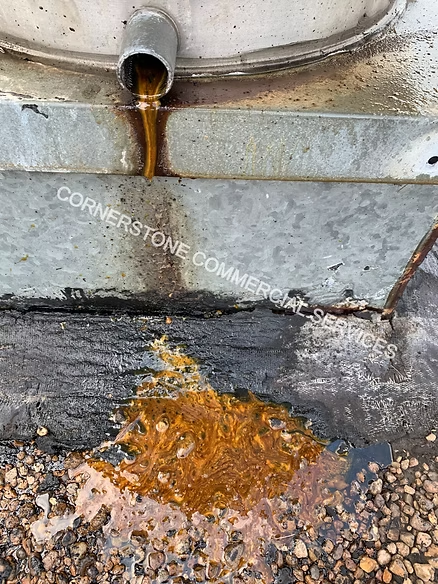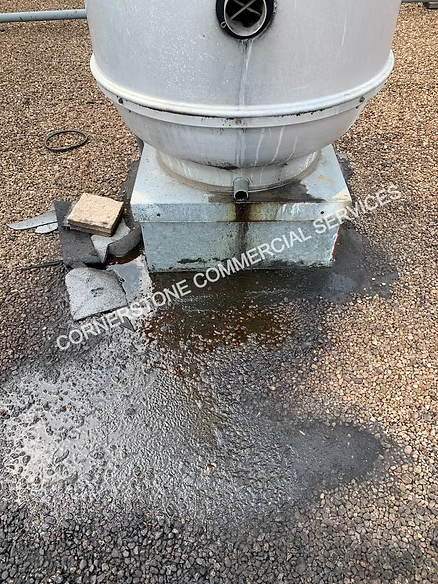If you have rooftop grease buildup, it is critical not only to clean it up, but also to determine what is causing it so that you can prevent it from happening in the future. Rooftop grease can cause structural damage, slip and fall accidents for maintenance and inspection crews, fire risk, and environmental health hazards. Let’s look at the top three causes of rooftop grease and how to solve the problem.
Where does the grease on the roof come from?
Whether you’re a food truck, a cafeteria, a four-star restaurant, or a drive-through franchise, nearly every commercial kitchen generates grease during the cooking process. Cooktops, griddles, grills, woks, fryers, and even low heat rotisseries will emit fats, oils, and other vapors into the air.
So, where does all that grease end up? Most of it is sucked up into your vent hood and exhausted by an rooftop exhaust fan if your ventilation system is functioning properly.
The grease filter in your restaurant hood system should remove the majority of the grease, fats and oils from your cooking. Some will, however, inevitably pass through and end up on the walls of your air ducts as well as the blades So if it’s doing what it’s supposed to, why do I have grease buildup on my roof? What is causing it, and what can you do about it?

1. The exhaust hood filters are dirty and ineffective.
As previously stated, the majority of the grease should be caught by your exhaust hood filters/baffles before it enters your ducts and is exhausted by your vent hood rooftop exhaust fan. However, if your restaurant hood system fails to do its job properly due to being dirty and/or improperly cleaned, grease may and will enter the rest of your system, where it can quickly build up and wreak havoc, producing a variety of issues ranging from an increased fire danger to decreased airflow. Due to the fact that dirty exhaust hood filters are less effective at retaining grease, more grease enters your restaurant hood system.
When exposed to growing levels of contaminants, vent hood exhaust fans may become overwhelmed by the amount of grease making its way to the fan and begin to spill that grease onto your rooftop. While it is undoubtedly recommended to follow NFPA 96 hood cleaning frequency guidelines based on the kind of cooking, you should also regularly check and analyze the cleanliness of your exhaust hood filters and change your cleaning plan as needed. It’s not just a matter of keeping oil off your roof. Cleaning exhaust hood filters on a regular basis helps your hood and fan system maintain appropriate airflow and ensures the overall functionality of your restaurant hood system.

2. The rooftop exhaust fan is leaking.
If you have been cleaning your vent hood exhaust system regularly, and your rooftop grease isn’t caused by filthy hood filters, it’s quite likely that your rooftop exhaust fan has a leak. While this can be caused by a physical fault with the fan, it is more typically caused by a lack of consistent and proper roof top exhaust fan cleaning. To be honest, we find it’s usually both issues contributing to the issues.
To eliminate grease buildup, you must keep your vent hood exhaust roof top fan clean and well maintained, much like your hood filters (and your duct work). It is often what you can’t see that creates the most problems (and money) later down the road. When fan blades get grease-coated, the fan becomes imbalanced and interferes with the vent hood roof top exhaust fan’s capacity to evacuate contaminated air. It will also begin to put a mechanical strain on your system ultimately leading to mechanical failure. When too much oil accumulates on a fan, it begins to flow onto the roof. Using a rooftop grease containment system around your roof top exhaust fan is the only way to protect your roof in case of an overflow event or emergency, but the ultimate objective is to avoid the grease from seeping out in the first place.
3. There is an issue with the grease collector on your rooftop ventilation fan.
The last most, and prevalent cause of rooftop grease buildup is an issue with your exhaust fan grease box, or a lack of one altogether. Without an exhaust fan grease box on your fan, any oil that gets to your fan blades would most likely spill out onto your rooftop.
Despite the fact that exhaust fan grease boxes are needed by law, many restaurant and commercial kitchen owners are unaware that their system is missing one since they rarely step foot on their establishment’s roof.
If you don’t already have an exhaust fan grease box, you should get one; and we don’t mean a bucket or catch pan. A grease box for an exhaust fan must be weatherproof, securely mounted to the fan, and fulfill NFPA 96 fire requirements for commercial kitchens. Exhaust fan grease boxes are simple to install and can save you thousands in cleaning and repairs. It’s a no-brainer as a simple and preventative step.
We understand how difficult it is to manage and run a commercial kitchen. Preventing grease from ever reaching your rooftop is the greatest approach to avoid unneeded problems that will cost you money and time to resolve. Grease buildup around your fan or on your roof is most often the result of filthy hood filters, a dirty rooftop ventilation fan, or a lack of effective grease containment and you have the ability to prevent it. Call Cornerstone Commercial Services today and let us provide you with an onsite system report card and estimate for cleaning at no charge. 1-800-274-3905






Comments are closed